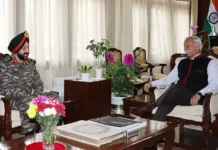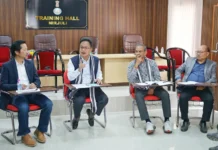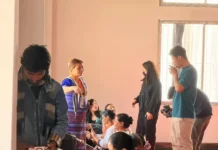RONO HILLS, 6 Apr: Rajiv Gandhi University (RGU), in collaboration with the health services directorate, the Arunachal Pradesh State AIDS Control Society (APSACS) and Plan International’s India chapter, observed the World Health Day at the university’s mini-auditorium here on Thursday.
World Health Day is observed every year on 7 April to mark the anniversary of the founding of the World Health Organisation in 1948. The theme for this year is ‘Health for all’.
RGU Vice Chancellor Prof Saket Kushwaha in a message said that, “to keep the body in good health is a duty; otherwise we shall not be able to keep our mind strong and clear.”
“Imagine having tons of dreams and all the potentialities to achieve everything we have dreamt of, but still we could not achieve it, just because of being unhealthy,” the VC said.
Health Services Director Dr M Lego in his presentation on ‘Challenges and recommendations for maintaining good health’ highlighted “environment and lifestyle as the important determinants when it comes to health.”
He recommended a few measures that could be implemented to ensure good health, “including focus on good mental health.”
Dr Lego said: “Stress and pain are direct byproducts of livelihood in our era.”
APSACS deputy director Tassor Pali highlighted the role of the APSACS and its initiatives to prevent AIDS, in collaboration with the Red Ribbon Club. He also enumerated the data and the numbers of HIV positive cases in the state, and informed that Papum Pare and Namsai districts have the highest numbers of such cases.
Plan International’s India chapter chief Dr Komal Goswami gave a brief introduction of her organisation and its works in the area of human rights, “focusing specifically on the rights of the girl child.”
She informed about ‘The Birds and Bees Talk’ (TBBT) project that emphasises on the health of young adolescents, especially girls.
RGU Finance Officer Prof Otem Padung highlighted “the need for education in leading a healthy lifestyle,” and stressed on “what to eat, when to eat, and how much to eat as mantra for health and longevity.”
RGU Registrar Dr NT Rikam said that everyone should participate in spreading awareness about good health, and highlighted “the relevance of planned lifestyle that should be followed to maintain healthy life.”
A letter of intent was signed between TBBT and the APSACS.
TBBT state lead Ashim Nicholas Kawa conveyed the message of Health Minister Alo Libang, who could not attend the programme due to other engagements.
TBBT project lead Trishita Sut spoke about the collaboration of TBBT with six other states of Northeast India.
“The project has covered two lakh students, 4,000 teachers and 2,000 schools,” she informed.
RGU Prof PK Panigrahi, National Security Studies Head (i/c) Dr Arvind Kushwaha and RGU’s Physical Education HoD Dr Sambhu Prasad also spoke.
Among others, students, scholars, and teaching and non-teaching staff of the university and the government higher secondary school here, besides members of TBBT project and the APSACS attended the programme.




